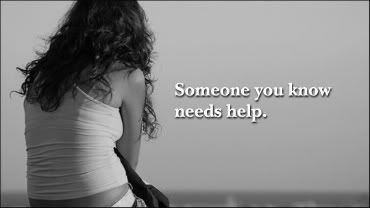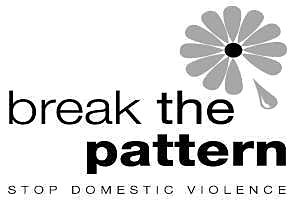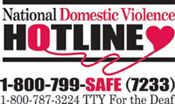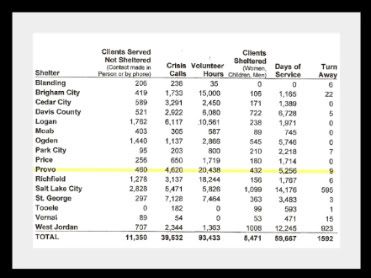
The terms "verbal abuse" and "physical abuse" are pretty self-explanatory. I noticed that when I told someone that I was being verbally abused or physically abused, they seemed to understand what I was talking about, even if only in a rudimentary way. Emotional abuse was nearly IMPOSSIBLE for me to describe to friends and family. It's such an insidious and covert form of abuse. People usually looked at me like I was CRAZY (I felt crazy). I had police officers show up during some of our many "fights" and assume I was using drugs because I was so hysterical.
Also, I can't count the number of times I've read or heard something to the effect of "he's not physically abusive" followed by something like "he won't let me leave the room" or "he throws things", etc. I, too, was a minimizer of my ex's physical abuse. He never put me in the hospital with his physical abuse, but he DID physically abuse me a great deal.
I also did not consider myself a victim of sexual abuse. I minimized that too. On a couple forums I've belonged to for quite a few years, I've read stories of outright RAPE being downplayed or even denied because the abuser was a "husband" or "boyfriend".
Some of the following information was found on a pamphlet that was given to me by the local victims' advocate many years ago. I remember what an eye-opener it was to me when I first read the original list. I've added a lot of things to the original list because I felt it was somewhat brief and lacking. It describes very succinctly the different forms of abuse.
Physical Abuse*Being pushed, hit, slapped, shoved, kicked, pinched or choked
*Being kept from leaving
*Being physically restrained
*Being restrained from using the phone to get help
*Having objects thrown at you
*Being locked out of the house
*Being abandoned
*Having weapons used to threaten or hurt you
*Being forced to eat
*Being prevented from eating
*Having hair pulled
*Being burned
*Being beaten
*Being a passenger in a vehicle being recklessly driven by him/her
*Being forced to stay awake
*Being denied medical/dental care
*Being denied hygienic products, showers, use of restroom
Sexual Abuse*Being forced into any sexual contact
*Being forced into prostitution
*Being subjected to unwarranted accusations of you having sex with other people
*Rape
*Having unwanted pain inflicted during sex
*Being called sexually derogatory names
*Being criticised sexually
*Being forced to strip, or being forcefully stripped
*Being subjected to unwanted sadistic sexual acts
*Having sex withheld
*Having sex made conditional on your behaviour or agreement to include practices you are not happy about, such as the use of porn or sex toys
*Having your feelings about sex or sexual preferences minimized or denied
*Being forced to have sex after a physical assault
*Being coerced into sex
*Having unwanted sexual photos taken; having sexual photos shared with other people/internet without consent
*Being forced to have sex while ill or tired
Emotional Abuse *Having approval, appreciation or affection withheld
as punishment*Being isolated from friends and/or family
*Being humiliated in front of others or in private
*Being prevented from using the car, or being told when to leave and return
*Being threatened to have the children taken away if you don't obey
*Being threatened with weapons
*Being threatened with physical violence against you, your family, or himself/herself
*Witnessing him/her hitting walls, doors, etc.
*Being intentionally intimidated by him/her
*Being checked up on
*Being forced to move to an isolated area
*Being left with lack of transportation or a telephone
*Having your friends/family be made to feel uncomfortable when visiting so that they cease
*Being punished for being late home by his/her complaining, bad moods, criticism or physical abuse
*Not being allowed to leave the house on your own
*Being required to report on your actions and conversations
*Being prevented from working and/or causing termination of employment
*Not being allowed any activity which excludes him/her
*Having your friends/family criticised
*Being forced to be dropped off and picked up from work, etc., by him/her
*Having your pets and/or children abused to punish you
*Having important possessions taken away or intentionally destroyed
*Being "gaslighted" or made to feel crazy/unstable/off balance
Financial Abuse*Having secrecy maintained regarding household finances
*Not being allowed to make or be included in decisions about finances
*Being prevented fair access to family funds/resources/accounts/checkbook
*Being prevented from getting or keeping a job
*Being denied sufficient housekeeping finances
*Being forced to account for every penny spent
*Having all bills put in your name
*Being forced to give him/her your paychecks
*Having money allocated to bills/groceries spent on himself/herself
*Being forced to beg or commit crimes for money
*Not being permitted to spend available funds on yourself or children
Verbal Abuse*Being yelled or shouted at
*Having threats made against you
*Being insulted and/or having your family insulted
*Being mocked or criticised about your interests, opinions or beliefs
*Being sneered at or growled at
*Being called derogatory names
*Being refused discussion of issues which are important to you
*Being laughed at or made fun of inappropriately
*Having nasty messages left for you
*Being accused of not trying hard enough or purposely doing something to annoy him/her
*Being blamed for his/her failures
*Being blamed for his/her abusive behavior
_________________________________________________
HOMEWORK!
Today, I spoke to one of the counselors at my local women's shelter and asked her specifically what they could really use in the care packages, so I've got a better idea of what to put on my homework list for anyone that wants to do this project with me. Keep checking the sidebar list and do whatever you feel you can. Thanks again!













